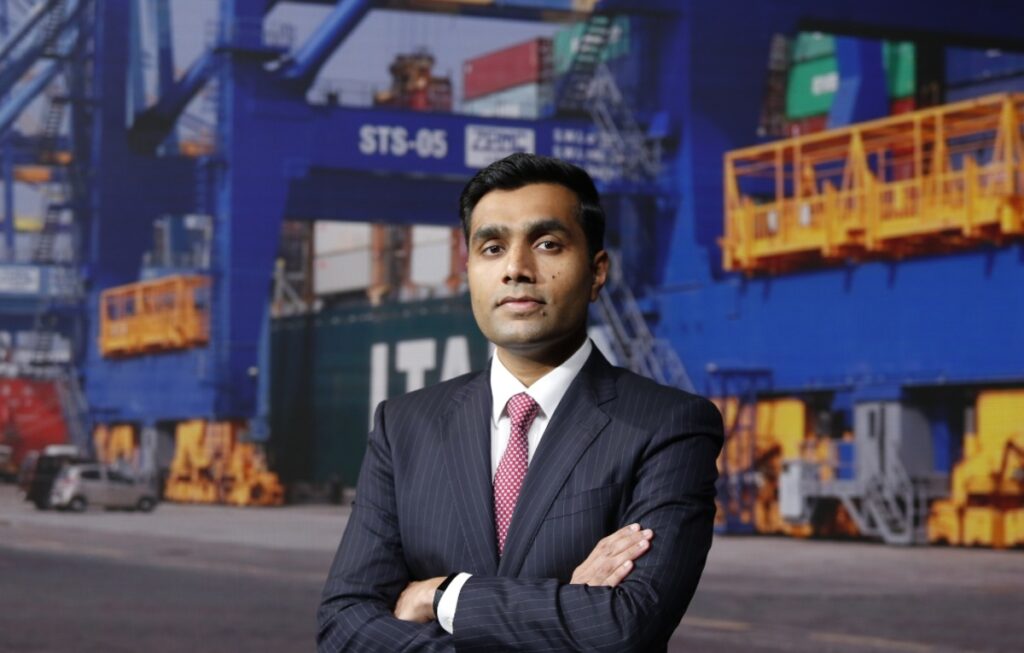Karan Adani, Managing Director of Adani Ports and Special Economic Zone Ltd (APSEZ), is aiming to make the company the world’s largest port operator by 2030. With 14 domestic ports, four of which are already in the World Bank’s Top 100 container port performance index, APSEZ is expanding globally through strategic projects such as the Vizhinjam transshipment terminal in India and the Haifa port in Israel.

FY25 Performance and Key Drivers
In FY25, APSEZ recorded revenue growth of 16%, Ebitda growth of 20%, and a 37% increase in PAT, surpassing projections. Karan Adani attributed this performance to the company’s integrated business model, focus on AI-led operational excellence, and strong leadership development. The ports division alone grew by 12% in revenue, with Ebitda margins at 73%. Logistics grew nearly 40%, and marine services expanded by over 80%, reflecting strong execution across business segments.
Strategic Acquisitions and Projects
Several major developments in the past year have strengthened APSEZ’s domestic and international presence:
- Gopalpur Port (India): Added 20 MMT capacity on the eastern coast
- Vizhinjam Port (India): India’s first deep-water transshipment hub with 18 MMT capacity
- Colombo Terminal (Sri Lanka): Added 3.2 million TEUs of annual container capacity
- NQXT (Australia): Brought in 50 MMT in bulk volume capacity
- Astro Offshore: Integrated 26 marine vessels for offshore logistics
These acquisitions have expanded APSEZ’s capacity and geographical reach while aligning with return-on-capital goals. The expanded network is expected to significantly boost both revenue and Ebitda.
Importance of Vizhinjam and Haifa
Vizhinjam and Haifa are central to APSEZ’s international strategy.
- Haifa Port connects APSEZ to Europe and the Mediterranean and strengthens trade access through the India–Middle East–Europe Economic Corridor.
- Vizhinjam Port, as India’s first fully automated deep-water port, enhances container-handling capabilities and provides access to global shipping routes connecting Asia, Europe, Africa, and the Americas.
Together, these ports position India strategically on global trade routes and elevate APSEZ’s global profile.
Future Goals and Expansion Plans
Karan Adani’s vision is to transform APSEZ into the world’s most trusted Integrated Transport Utility. Key growth targets include:
- Handling over 1 billion metric tonnes of cargo annually by 2030
- Expanding logistics operations with 300+ trains, 20 logistics parks, 5,000+ trucks, and 20 million+ sq. ft. warehousing
- Tripling revenue in marine services through fleet expansion and offshore capabilities
This strategy is supported by continued innovation, AI-driven efficiency, and strong investments in talent and leadership.
New Ventures in Cement and Copper
Beyond ports, APSEZ is entering sectors vital to India’s industrial future:
- Copper: India imports nearly 40% of its refined copper. The Kutch Copper project will initially produce 500,000 tonnes annually, aiming to reduce import dependence and support the green energy and EV ecosystem.
- Cement: As India undergoes a $2.2 trillion infrastructure transformation, APSEZ has become the country’s second-largest cement producer. The aim is to cater to 30% of national demand, with a focus on premium, sustainable cement production.
In both sectors, the approach mirrors APSEZ’s core strategy: identifying growth sectors, in
